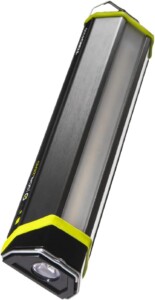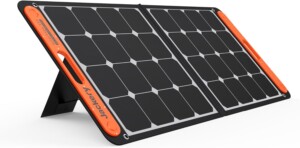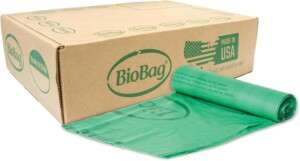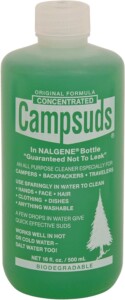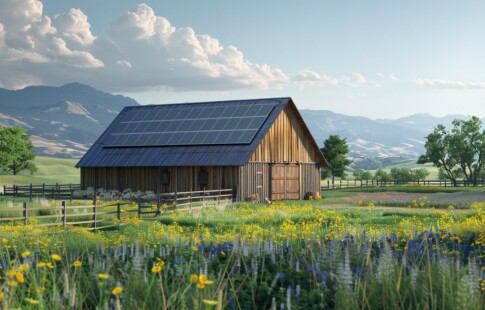
The Best Eco-Friendly Gear for Camping
We are reader-supported. When you buy through links on our site, we may earn affiliate commission.
Camping offers a great escape from the fast-paced world — a chance to disconnect from our daily routines and reconnect with nature. Sleeping under the stars, waking up to birds singing, and sitting by the campfire grounds us, offering a sense of stillness and peace.
Yet, while camping is inherently an eco-friendly vacation, it’s essential to remember that the gear you carry still leaves a lasting impact on the environment. Whether it’s the tent you sleep in or the utensils you use for eating, your choices can either protect or harm the cherished natural spaces.
The good news is that it’s possible to lessen your carbon footprint while camping by choosing the right gear. Here is the best eco-friendly gear for camping on the market.
Why the Best Eco-Friendly Gear for Camping Is Essential
Eco-friendly camping is a way of enjoying the great outdoors with minimal environmental impact. It revolves around the principle of leaving no trace, meaning campers aim to leave nature as they have found it, if not better. This extends to every aspect of the camping experience, from where you purchase your tent to the gear you choose to bring along.
Choosing the best eco-friendly camping gear is crucial because it helps the environment and future generations. The equipment you use can significantly affect the ecosystems you love.
Traditional camping gear often contributes to environmental pollution and resource depletion, whereas eco-friendly alternatives are designed to minimize these impacts. They are usually made from renewable, recyclable or biodegradable materials and designed for long-term use.
Imagine each time you opt for a solar-powered lantern over a battery-powered one or choose a biodegradable soap over a regular bar. The choices you make collectively add up, reduce your carbon footprint and preserve nature for future generations to enjoy. Rather than making eco-friendly camping gear an option, consider it as a responsibility toward the planet.
Best Eco-Friendly Camping Gear Essentials
If you’re curious about what types of eco-friendly camping gear are out there, consider this list below.
1. Sustainable Tents
What makes a tent truly eco-friendly? Key factors include the materials used, the manufacturing process and the tent’s durability. Eco-friendly tents typically have recycled or organic materials and have been manufactured in a way that minimizes carbon emissions. Longevity is also vital — the longer a tent lasts, the less waste is produced.
Here are a few recommendations:
- NEMO’s Recycled Series: NEMO’s tents are constructed using repurposed materials without compromising strength and durability. It’s an excellent choice of a brand that combines technical performance with environmental responsibility.
- Big Agnes Salt Creek Tent: Big Agnes is another eco-conscious brand pushing the boundaries of sustainable design. Their Salt Creek Tent series is partly made from recycled materials and features solvent-free polyurethane seam tapes, reducing its environmental impact.
- Vango’s Earth Collection: Vango’s Earth Collection takes sustainability seriously. These tents are made from Sentinel Eco Fabric, a material crafted from recycled single-use plastics. Strong, waterproof and eco-friendly, they make a perfect companion for the environmentally conscious camper.
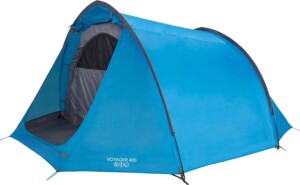
Vango Voyager 400 Tunnel Tent-River, 4 Persons
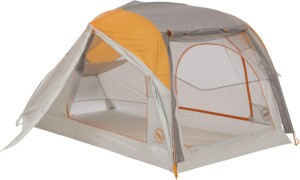
Big Agnes Salt Creek SL Backpacking Tent
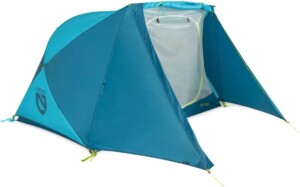
NEMO Switch™ Multi-Configuration Camping Tent & Shelter 2-Person
2. Eco-Friendly Sleeping Bags
Eco-friendly sleeping bags make a fantastic choice for campers prioritizing comfort and sustainability. These sleeping bags often utilize materials like recycled or organic fabrics and down, reducing waste and carbon emissions. Furthermore, sustainable manufacturing practices often lead to high-quality, durable products that withstand many camping seasons, making it a smart investment.
Here are our top picks for eco-friendly sleeping bags:
- Rab Mythic Ultra Down Insulated Ultralight Sleeping Bag: This ultra-lightweight bag uses a sustainable down filling and boasts an impressive warmth-to-weight ratio, a godsend for minimalist hikers.
- The North Face Eco Trail Bed 20 Sleeping Bag: This three-season bag is made entirely from recycled materials. Its synthetic insulation keeps you warm even in wet conditions, a bonus for those unpredictable weather trips.
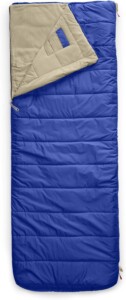
The North Face Eco Trail Bed 20 Sleeping Bag

Rab Mythic Ultra Down Insulated Ultralight Sleeping Bag for Climbing and Mountaineering
3. Eco-Friendly Cooking and Eating Utensils
Traditional utensils often incorporate single-use plastics or non-recyclable materials, contributing to waste and potential pollution. By switching to eco-friendlier alternatives, campers can reduce their environmental impact significantly. These sustainable options are durable, lightweight and easy to clean — perfect for the trails.
Here are a few excellent eco-friendly utensils:
- To-Go Ware Bamboo Utensil Set: This reusable set includes a knife, fork, spoon, straw and chopsticks, all made from renewable bamboo. Plus, it has a bottle opener for extra utility. Lightweight and compact, it’s an excellent replacement for plastic cutlery.
- Snow Peak Titanium Spork: Versatile and ultralight, this spork is a camper’s best friend. The titanium construction ensures its durability and longevity.
- GSI Outdoors Infinity Backpacker Mug: Made from BPA-free, non-leaching polypropylene, this mug is perfect for camping with hot beverages. It’s durable, insulated, and comes with a sealable lid to prevent spills.
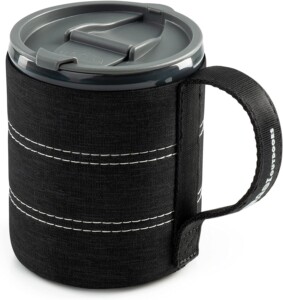
GSI Outdoors Infinity Backpacker Mug

Snow Peak Titanium Spork
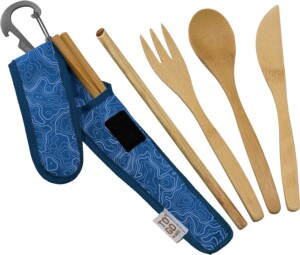
TO GO WARE Premium Reusable Bamboo Utensil Travel Set
4. Solar-Powered Camping Gear
Solar-powered camping gear harnesses the abundant energy of the sun to fuel your outdoor adventures, reducing reliance on non-renewable energy sources and eliminating battery waste. While this helps to minimize your environmental footprint, it also adds convenience, reliability and efficiency to your outdoor setup.
Check out these top picks in solar-powered gear:
- Jackery SolarSaga 100W Portable Solar Panel: A high-efficiency solar panel that pairs with Jackery’s portable power stations. Compact and lightweight, it’s excellent for powering devices when off-grid.
- Goal Zero 500 Lumen Torch Light: This is more than just your normal flashlight. It also features a built-in solar panel and hand crank if you need light in a pinch. Additionally, it can serve as an emergency power bank for your devices — an excellent all-around piece of equipment for sustainable campers.
5. Biodegradable Campsite Products
Biodegradable camp products such as soaps, wipes and trash bags can significantly reduce the environmental impact of your outdoor adventures. These items break down naturally over time, reducing landfill waste and preventing pollution. Campers offer a simple and practical way to maintain cleanliness and hygiene without harming the environment.
Here are some top-rated biodegradable campsite products:
- Campsuds: This all-purpose, biodegradable soap is ideal for camping. Gentle on the environment and tough on dirt, it’s perfect for dishes, gear or personal hygiene.
- BioBag Compostable Trash Bags: Clean up your campsite with these bags that fully compost in a matter of months. They’re a great alternative to traditional plastic bags that can take hundreds of years to decompose.
- Combat Wipes: These are 100% biodegradable and great for personal hygiene on the trail. They offer a quick and convenient way to freshen up while respecting nature.
Using the Best Eco-Friendly Gear for Camping
The best eco-friendly camping gear offers a tangible way to respect and protect the natural world. Each sustainable item, from your tent to your utensils, contributes to a greener planet. All campers should choose eco-friendly gear for their next adventure because every small action toward sustainability matters.
Share on
Like what you read? Join other Environment.co readers!
Get the latest updates on our planet by subscribing to the Environment.co newsletter!
About the author
Steve Russell
Steve is the Managing Editor of Environment.co and regularly contributes articles related to wildlife, biodiversity, and recycling. His passions include wildlife photography and bird watching.
